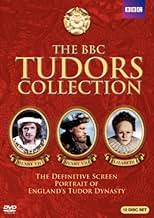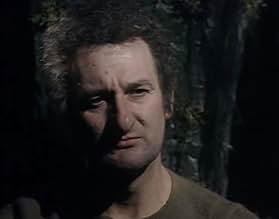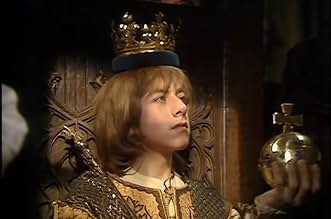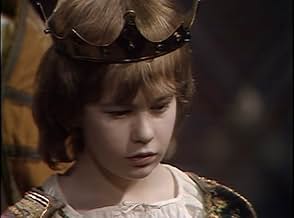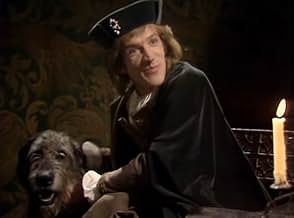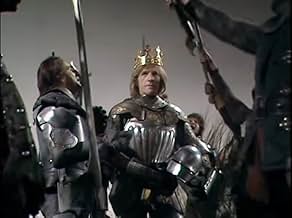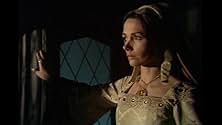Ajouter une intrigue dans votre langueA series recording the key events in the reign of Henry Tudor and his founding of the Tudor DynastyA series recording the key events in the reign of Henry Tudor and his founding of the Tudor DynastyA series recording the key events in the reign of Henry Tudor and his founding of the Tudor Dynasty
Parcourir les épisodes
Avis en vedette
In the early 1970's 'The Six Wives of Henry VIII' and 'Elizabeth R' enthralled the TV viewers of the UK with superb acting, gorgeous costumes, incisive scripts and high - for the time - production values. Even more exciting they were in colour, which was a real novelty at the time.
Looking for a follow-up project the BBC decided to go back in time to the founding of the Tudor line by Henry VII. The unfortunate truth is that Henry senior was far less colourful than his son or granddaughter. He was a shrewd ruler who used bureaucracy, the law and financial policy to maintain his power - and he was devotedly married to his wife Elizabeth and heart-broken when she died. In other words a bit of a cold fish with little fire and romance to turn into 12 hours of TV drama.
This story could have been told in half the time or less, but the BBC obviously thought they were on the crest of a wave and got too greedy. The result was a long-winded trudge through 24 years of history. Henry's reign was not uneventful, nor unsuccessful, but there were no wives or mistresses, no Spanish Armada and no rousing speeches.
The scripts are turgid and wordy and some of the acting positively amateurish. The younger women are also too much like 1960's 'dolly birds' as we called them then. If you enjoyed the other Tudor series of the time, don't think this is of the same quality. One to avoid.
Looking for a follow-up project the BBC decided to go back in time to the founding of the Tudor line by Henry VII. The unfortunate truth is that Henry senior was far less colourful than his son or granddaughter. He was a shrewd ruler who used bureaucracy, the law and financial policy to maintain his power - and he was devotedly married to his wife Elizabeth and heart-broken when she died. In other words a bit of a cold fish with little fire and romance to turn into 12 hours of TV drama.
This story could have been told in half the time or less, but the BBC obviously thought they were on the crest of a wave and got too greedy. The result was a long-winded trudge through 24 years of history. Henry's reign was not uneventful, nor unsuccessful, but there were no wives or mistresses, no Spanish Armada and no rousing speeches.
The scripts are turgid and wordy and some of the acting positively amateurish. The younger women are also too much like 1960's 'dolly birds' as we called them then. If you enjoyed the other Tudor series of the time, don't think this is of the same quality. One to avoid.
I found this mini series quite by accident. Although it can be a bit stagey and talky, I really enjoyed it. It's not about the son, it's the dad. Can't recall many biographies or documentaries about King Henry VII. I think John Maxwell is awesome. Then as the series progresses we have Geoffrey Palmer, John Castle, Rachel Kempson, and. Peter Bowles, all early in there careers.
I like the production value and the costumes look right. It maybe a tad long but that didn't bother me too much. I binged for 6 hrs took a break..LOL then watched the final seven.
I always thought Henry VII was an interesting character, from being a loved King only to become miserly and miserable later in life. He'd make a great Psychological study.
The other upside was seeing some great acting from people I never her of. Bruce Hodgkins, Norma West, Hugh Sullivan and especially Marigold Sharman.
It takes great acting to make a rather talky production watchable and it certainly is for me.
I like the production value and the costumes look right. It maybe a tad long but that didn't bother me too much. I binged for 6 hrs took a break..LOL then watched the final seven.
I always thought Henry VII was an interesting character, from being a loved King only to become miserly and miserable later in life. He'd make a great Psychological study.
The other upside was seeing some great acting from people I never her of. Bruce Hodgkins, Norma West, Hugh Sullivan and especially Marigold Sharman.
It takes great acting to make a rather talky production watchable and it certainly is for me.
Everything most modern historical shows (especially about the 15th-16th century English monarchs-- you know what they are) are not. Writing, historical accuracy, and top-quality acting are prized over sensationalism and sex, and the show is all the more intriguing for it. It hardly matters that the budget is low or that the camerawork isn't super "cinematic"-- the political intrigue and Henry VII's tightrope walk between being a good king, businessman, and family man are just wonderful to watch.
Impossible to imagine being made now, The Shadow of the Tower is a deep and insightful look at the Tudor era's least remembered ruler and its founder: Henry VII.
The writing is always engaging even in the weaker episodes and there is a great eye for historical detail. Some episodes rise even higher than the rest, particulary those written by Hugh Whitemore.
I see many reviewers here accuse the show of bad acting. I cannot understand that. Some minor roles are of course, but then I can't imagine what these people would make of more recent shows like the Tudors. I am sure nobody thinks that of James Maxwell who is obviously the stand out in portraying a compassionate, fair ruler who is occasionally conflicted but is also highly intelligent.
Where it works in history it perhaps fails in drama. It is really a dramatised documentary though probably more accurate than most. I think a lot of people would find it dull. The history is what it is interested in, however, and there is not a wasted word as far as I am concerned. Henry's reign may not on the surface be especially dramatic compared to others but it was actually poised on a very interesting turning point in the shift from the Middle Ages to the Modern Age.
I would recommend to anyone interested in history and the episode "The Serpent and the Comforter" works great as a standalone.
I would recommend to anyone interested in history and the episode "The Serpent and the Comforter" works great as a standalone.
Victorious at Bosworth Fields, Henry VII assumes the crown of England but is forced to deal with pretenders, disloyalty, and insurrection while trying to rule as a benevolent and enlightened King. James Maxwell is quite good as Henry and the cast, made up of competent, albeit not noteworthy, British actor and actresses is fine. The stagy look of the film makes up for the obvious limited budget and the script has that pseudo-Shakespearian weightiness than makes for a good historical outing. The episodic series was made as a 'prequel' to the BBC's very popular 'The Six Wives of Henry VIII' and 'Elizabeth R', (both 1971) and the three productions seen in historical order would make for an entertaining and educational excursion through the sometimes benign, sometimes bloody, three generation Tudor dynasty.
Le saviez-vous
- AnecdotesJames Maxwell (Henry VII) was the only actor to appear in all thirteen episodes of the series.
- ConnexionsRemake of Tower of London: The Innocent (1969)
Meilleurs choix
Connectez-vous pour évaluer et surveiller les recommandations personnalisées
- How many seasons does The Shadow of the Tower have?Propulsé par Alexa
Détails
- Durée1 heure
- Couleur
Contribuer à cette page
Suggérer une modification ou ajouter du contenu manquant

Lacune principale
By what name was The Shadow of the Tower (1972) officially released in Canada in English?
Répondre


